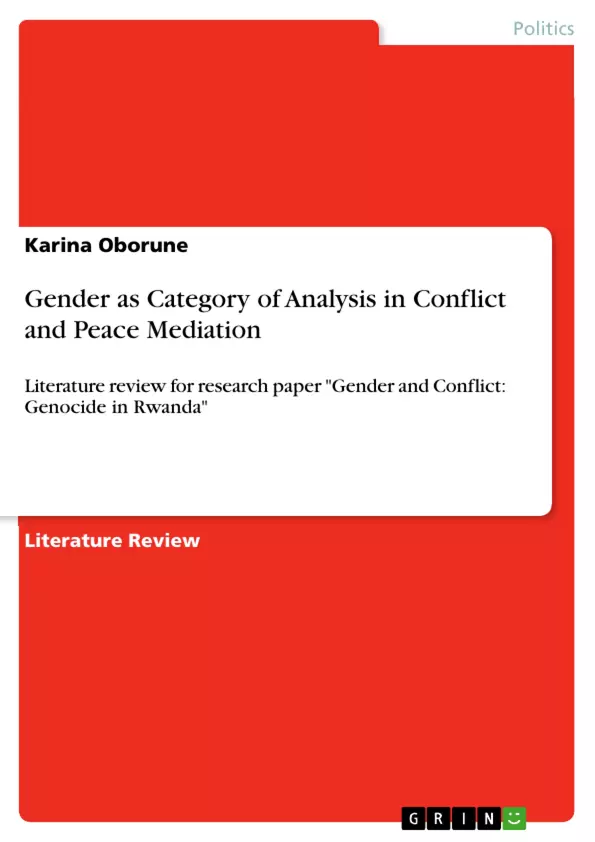The purpose of this literature review is to look at gender as a category of analysis in conflict and peace mediation. The analysis will provide the material basis for a research paper on “Gender and Conflict: Genocide in Rwanda” in the course “Gender, Politics and Intersectionality in Europe”. I put forward the thesis statement that genocide in Rwanda should be analysed in gender-specific terms and on different levels (individual, community) andat different phases (open-conflict, post-conflict).
I have focused on papers by Cordula Reimann, who has a particular interest in largely hidden gender-specific sub-context of violent conflicts and their resolution. The literature review is divided into three parts. I begin with defining ‘gender’. The second part is the analysis of women’s and men’s different roles at various levels and phases of conflict. The third part deals with the question of what kind of checklist and indicators we need to take into account while analysing conflict in gender specific dimensions.
Inhaltsverzeichnis (Table of Contents)
- Introduction
- I Defining gender and intersectionality
- II Gender-specific roles in conflict
- III Comparative perspective
- IV Key principles in analysis of conflict
- Conclusion
Zielsetzung und Themenschwerpunkte (Objectives and Key Themes)
This literature review aims to analyze gender as a crucial category in the context of conflict and peace mediation. The review utilizes the work of Cordula Reimann, who focuses on the often-overlooked gender dynamics within violent conflicts and their resolution, to provide the foundation for a research paper titled “Gender and Conflict: Genocide in Rwanda”.
- Defining gender as a social construct and its multifaceted dimensions: individual identity, symbolism, and structure.
- Analyzing distinct gender roles within different phases and levels of conflict (individual, community, and state).
- Exploring the impact of intersectionality, highlighting how multiple identities and experiences of marginalization influence conflict dynamics.
- Examining key principles and considerations for incorporating a gender perspective in conflict analysis.
- Utilizing the findings of this review to inform a research paper examining gender and conflict in the Rwandan genocide.
Zusammenfassung der Kapitel (Chapter Summaries)
The review begins by defining gender as a social construct, drawing upon Reimann's work, which emphasizes its multidimensional nature, including individual identity, symbolism, and structure. It also introduces intersectionality as a crucial concept for understanding how multiple identities intersect and shape experiences of power, exclusion, and discrimination. The second section delves into gender-specific roles within conflict, focusing on the differing experiences of men and women at individual, community, and state levels during both open conflict and post-conflict phases. The third section presents a comparative analysis of gender-specific roles in open and post-conflict situations, drawing upon existing research on armed conflict. The fourth section analyzes key principles for incorporating a gender perspective in conflict analysis, including the need for including women in negotiations and recognizing the diverse needs and experiences of both men and women. This section emphasizes that a gender perspective is not solely focused on women’s issues but rather acknowledges the distinct roles and challenges faced by both genders in conflict. The conclusion highlights the implications of this literature review for a research paper on the Rwandan genocide.
Schlüsselwörter (Keywords)
Key terms and concepts central to this literature review include gender as a social construct, intersectionality, gender-specific roles, conflict analysis, peace mediation, gender perspective, and the Rwandan genocide. The review examines how these concepts intersect to provide a comprehensive framework for understanding the complexities of gender dynamics within violent conflicts.
Frequently Asked Questions
Why is gender a crucial category in conflict analysis?
The review argues that violent conflicts, like the Rwandan genocide, have hidden gender-specific sub-contexts that influence both the nature of the violence and the possibilities for resolution.
What is the focus of Cordula Reimann's work in this context?
Reimann focuses on gender-specific dimensions of conflict at various levels (individual, community, state) and phases (open-conflict, post-conflict), emphasizing gender as a social construct.
How does intersectionality relate to peace mediation?
Intersectionality helps understand how multiple identities (e.g., gender, ethnicity, class) intersect to shape experiences of marginalization and power dynamics during and after a conflict.
What are the different roles of men and women in the Rwandan genocide?
The study analyzes how gender roles shift during open conflict and the post-conflict phase, addressing both women's and men's distinct experiences and needs.
Why should women be included in peace negotiations?
A gender perspective recognizes that sustainable peace requires addressing the diverse challenges faced by all genders, which is only possible if women are actively involved in the mediation process.
- Citation du texte
- Karina Oborune (Auteur), 2010, Gender as Category of Analysis in Conflict and Peace Mediation, Munich, GRIN Verlag, https://www.grin.com/document/152283



